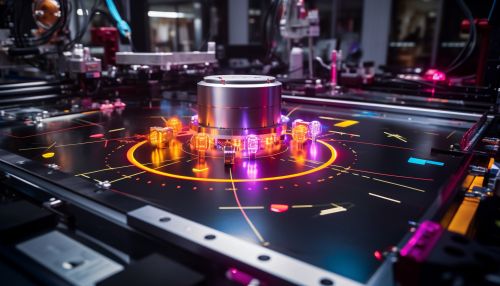The Physics of Quantum Simulation with Cold Molecules
Introduction
Quantum simulation with cold molecules is a rapidly advancing field in quantum physics that aims to simulate and understand complex quantum systems. Cold molecules, due to their rich internal structures and tunable interactions, provide a versatile platform for quantum simulation. This article delves into the physics behind this intriguing concept, exploring the principles, techniques, and potential applications in a comprehensive and detailed manner.


Cold Molecules in Quantum Physics
Cold molecules, typically at temperatures below 1 Kelvin, exhibit unique quantum mechanical properties that make them ideal for quantum simulations. These properties include long coherence times, strong interactions, and a high degree of control over their quantum states. The study of cold molecules in quantum physics is a specialized field, often intersecting with atomic physics, molecular physics, and quantum information science.
Quantum Simulation
Quantum simulation is a technique used to model quantum systems that are too complex to be studied directly or simulated on classical computers. The idea is to use a well-controlled quantum system (the simulator) to mimic the behavior of another, less accessible quantum system (the target). Quantum simulators can be broadly classified into two types: analog simulators and digital simulators.
Analog Quantum Simulators
Analog quantum simulators are systems that naturally mimic the Hamiltonian of the target system. They are typically used to simulate static properties of quantum systems, such as ground state properties and phase transitions.
Digital Quantum Simulators
Digital quantum simulators, on the other hand, use a sequence of quantum gates to approximate the evolution of the target system. They are more versatile than analog simulators, as they can simulate a wider range of quantum systems, but they also require more control over the quantum states.
Quantum Simulation with Cold Molecules
Quantum simulation with cold molecules leverages the unique properties of cold molecules to simulate complex quantum systems. This approach has several advantages, including the ability to simulate both fermionic and bosonic systems, strong and tunable interactions, and the potential for scalability.
Preparation of Cold Molecules
The preparation of cold molecules for quantum simulation involves several steps, including cooling, trapping, and state preparation. Techniques such as laser cooling, evaporative cooling, and magneto-optical trapping are commonly used to cool and trap the molecules. State preparation, on the other hand, involves manipulating the quantum states of the molecules to the desired initial state.
Quantum Simulation Techniques
Various techniques can be used to perform quantum simulation with cold molecules. These include quantum logic gates, quantum state transfer, and quantum algorithms. Quantum logic gates are fundamental operations that can be performed on quantum bits (qubits), while quantum state transfer involves transferring the quantum state of one particle to another. Quantum algorithms, on the other hand, are sequences of quantum operations designed to solve specific problems.
Potential Applications
Quantum simulation with cold molecules has a wide range of potential applications, including quantum computing, quantum metrology, and quantum chemistry. In quantum computing, cold molecules can be used as qubits, the basic units of quantum information. In quantum metrology, cold molecules can be used to make precise measurements of physical quantities. In quantum chemistry, quantum simulation with cold molecules can be used to study chemical reactions at the quantum level.
Conclusion
Quantum simulation with cold molecules is a promising field with the potential to revolutionize our understanding of quantum systems. By leveraging the unique properties of cold molecules, researchers are able to simulate complex quantum systems that are beyond the reach of classical computers. While there are still many challenges to overcome, the field is advancing rapidly, and the future of quantum simulation with cold molecules looks bright.
